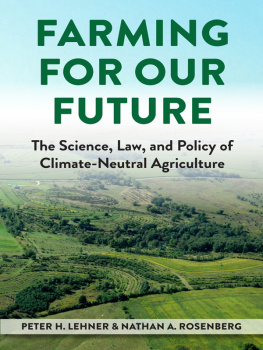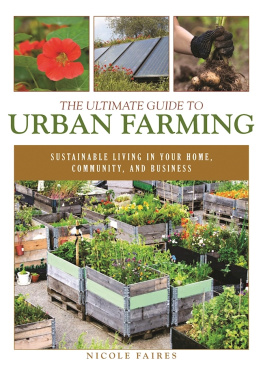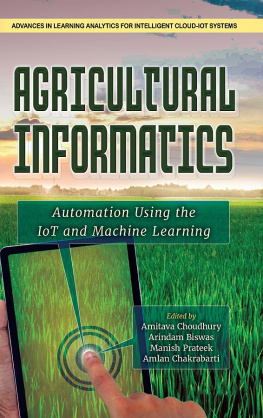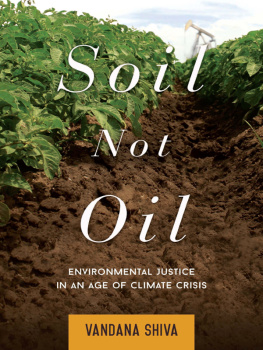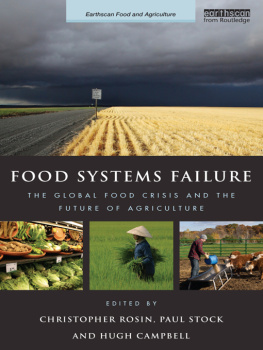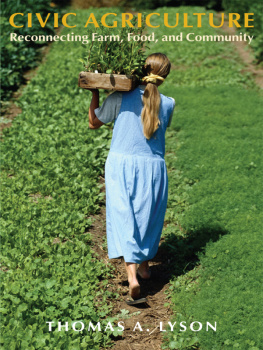Praise for
The Emergent Agriculture
Tipping points in food and farming are obvious to anyone courageous enough to look. This highly readable treatise explains the healing future awaiting us. Lets learn, embrace, and move forward. This book describes the future perfectly.
JOEL SALATIN, Polyface Farm
Heres the inside story on the most hopeful development in American culture in recent years. As local food systems grow and intertwine, they form a subversive challenge to the too-big-to-fail agriculture weve somehow come to accept as normal.
BILL MCKIBBEN, author Deep Economy
In The Emergent Agriculture, Gary Kleppel leverages his extensive experience as an ecologist, teacher and farmer for an honest, sound and accessible examination of the often hidden costs of our current industrial agro-food system and the rise of one based on ethics, ecology and community thats replacing it.
SEAN CLARK, farm director and agricultural ecologist, Berea College, Kentucky
Dr. Kleppel makes an eloquent and well-researched case for supporting agricultural production that is community-based, appropriately scaled to local resources, nutritionally rich and ethical. The content evokes Wendell Berry and Michael Pollan, but with many fresh insights about the enriched food systems that are sprouting from the ground up across the globe.
MARIANNE SARRANTONIO, Associate Professor of Sustainable Agriculture, University of Maine


Copyright 2014 by Gary S. Kleppel.
All rights reserved.
Cover design by Diane McIntosh.
Cover images iStock (Horse and farmer: small frog, frolicking lambs, Mathew Lees Dixon; organic farmer: alle12)
First printing June 2014.
New Society Publishers acknowledges the financial support of the Government of Canada through the Canada Book Fund (CBF) for our publishing activities.
Paperback ISBN: 978-0-86571-773-2
eISBN: 978-1-55092-577-7
Inquiries regarding requests to reprint all or part of The Emergent Agriculture should be addressed to New Society Publishers at the address below.
To order directly from the publishers, please call toll-free (North America) 1-800-567-6772, or order online at www.newsociety.com
Any other inquiries can be directed by mail to:
New Society Publishers
P.O. Box 189, Gabriola Island, BC V0R 1X0, Canada
(250) 247-9737
New Society Publishers mission is to publish books that contribute in fundamental ways to building an ecologically sustainable and just society, and to do so with the least possible impact on the environment, in a manner that models this vision. We are committed to doing this not just through education, but through action. The interior pages of our bound books are printed on Forest Stewardship Council-registered acid-free paper that is 100% post-consumer recycled (100% old growth forest-free), processed chlorine-free, and printed with vegetable-based, low-VOC inks, with covers produced using FSC-registered stock. New Society also works to reduce its carbon footprint, and purchases carbon offsets based on an annual audit to ensure a carbon neutral footprint. For further information, or to browse our full list of books and purchase securely, visit our website at: www.newsociety.com
Library and Archives Canada Cataloguing in Publication
Kleppel, G. S. (Gary S.), author
The emergent agriculture : farming, sustainability and the return of the local economy / Gary S. Kleppel ; foreword by John Ikerd.
Includes bibliographical references and index.
Issued in print and electronic formats.
ISBN 978-0-86571-773-2 (pbk.).--ISBN 978-1-55092-577-7 (ebook)
1. Sustainable agriculture. 2. Sustainable agriculture--Economic aspects. 3. Farms, Small. 4. Farms, Small--Economic aspects. I. Title.
S494.5.S86K64 2014 | 333.7616 | C2014-902321-9 |
C2014-902322-7 |

For Pam and Jarret
Contents
T HIS BOOK WAS A WORK OF PASSION. It emerged as a result of the contact I have had over the past decade with some of the most amazing people I have ever met the people who produce our food. I will be forever grateful to the farmers and food service people who allowed me to tell their stories and relate vignettes and anecdotes about their lives. The Emergent Agriculture took shape as I told the stories of people like Jim and Adele Hayes, Mark and Kristin Kimball, the Ball family, the Abbruzzese family, Shannon Hayes and Bob Hooper, Thomas Christenfeld, Slim and Cathy Newcomb, Kathleen Harris, Jean-Paul Courtens and Jody Bolluyt, Jody and Luisa Somers, Stephen Pearse, and Dan and Vicki Purdy. Many others, not mentioned by name within these pages, have been just as inspirational. These include, Barbara and Bernie Armata, Regina, Bill and Christian Embler, Alexander Sandy Gordon, Ken Kleinpeter, Richie Gaige, Jr. and Amanda Terhune, Seth McEachron, Ben and Lindsey Shute, Clemens Mackay and Jenny Rosinki, Jon and April Audietis, and Severine von Tscharner Fleming. These people epitomize, in the way they live, work, and relate to others, the iconic image of the American farmer. They work so hard and set such a high standard of excellence in the pursuit of their craft and in their ethics that it is impossible not to notice them, respect them, and want to follow the example they have set. These folks have been good and patient teachers, superb role models, and clear examples of the best that America has to offer. And yet, they are typical of farmers everywhere. They are the reason I wrote this book.
Although I have been publishing in the technical and discipline-based literature for nearly 40 years, writing socially-focused non-fiction proved surprisingly tough and sometimes humbling. As I read and re-read drafts of the manuscript, I realized how difficult it is to communicate in my own voice. Syntax, simple grammar and the creation of sentences on the page that sounded as though I was speaking directly to the reader, proved challenging to say the least. I owe an enormous debt of gratitude to Paul Tick, and to Rebecca and Roger Meyers all of whom I met at the Delmar Farmers Market for their editorial assistance. I am also grateful to Ian le Cheminant, my copy editor, who with nearly the patience of a saint managed to get the final draft of the manuscript ready for press, almost on time. I am indebted as well to my friend and teacher, Dr. Richard Pieper, emeritus of the University of Southern California. Thirty years ago, Rick, an oceanographer, was my post-doctoral advisor. He read my work then as an expert in my discipline and he read my work now, as a typical consumer of literature, but without the background in agriculture. Now, as then, he let me know what made sense and what didnt, and where I needed to modify the text to reach an audience that was not assumed to have expertise in farming or to be familiar with the message of the book.
Finally, there is the dog. In a recent article, The New York Times referred to the border collie as the farmers most useful tool. I can attest to that. I would probably not still be farming if not for my border collie, Tory. There are probably people reading this who see little point acknowledging the contribution of a dog to ones book. I would have to agree. It is hokey. And Tory, as smart as she is, wont be reading this anytime soon. So whats the point?
Next page

